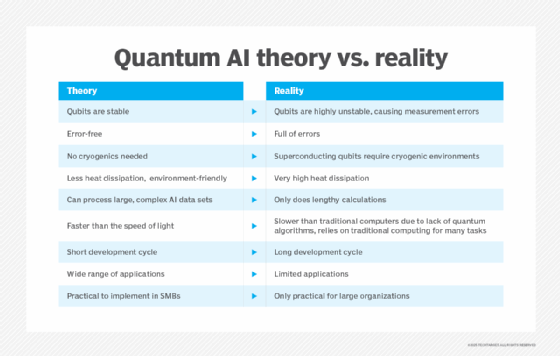Quantum AI: Explaining how it will impact the business world
Quantum computers could boost AI with faster training on big data and better problem-solving abilities. But combining the two in practical business applications could take years.
The recent explosion of interest in quantum computing, with its potential to deliver unprecedented levels of compute power, comes during a golden age of AI when AI is finally living up to much of its promise.
So, it's fitting that researchers and companies on the leading edge of technology have been looking at ways to combine the two. Here's why quantum AI is potentially so powerful and why realizing that potential depends on overcoming significant technical and financial hurdles.
How does quantum AI work?
Quantum AI (QAI) integrates quantum computing and AI, building on principles of quantum mechanics, such as superposition, entanglement and parallelism. Unlike AI that runs on classical computers, which use the familiar ones and zeros of binary computing, quantum AI works through qubits -- the fundamental units of quantum computing -- to process and store data. Qubits can exist in multiple states through the superposition of zero and one.
By integrating principles of quantum mechanics into AI, quantum AI can theoretically take advantage of combining the "intelligence" of AI with high-speed, error-free quantum computing.
Quantum-powered AI is implemented in quantum neural networks (QNNs). Traditional neural networks mimic the biological neurons of the human brain to process data. But, unlike these neural networks that are built on perceptrons -- models of biological neurons -- quantum neural networks operate with qubits. Proponents say this new type of neural network could have advantages over traditional neural nets for training AI on big data sets. Some large companies and quantum computing providers are already using QNNs, which, despite their significant differences, use the same neural network architecture as traditional neural nets.
Quantum AI algorithms operate via qubits in different layers of this architecture. In the input layer, a quantum computer encodes data into qubits, and qubit processing takes place at what's called the hidden layer. At the output layer, qubits are measured and fed to error detection and control, where AI can use high-speed computing to correct errors. At the end stage, AI interprets the results of the quantum processing to provide insights that can help in decision-making.
AI is also used in designing the quantum circuits that process the qubits in quantum AI.
Benefits of quantum AI
The purpose of quantum-powered AI is to build advanced machine learning (ML) models and improve existing ones. Its capabilities are expected to surpass what's possible with AI on classical computers. However, quantum AI is in the early stages of development -- more a promising technology than an imminent reality.
The theoretical and practically observed benefits include the following:
- Massive parallelism. Data centers rely on parallel processing, which divides tasks among processors and accelerators. Thanks to superposition, quantum AI can approximate multiple computations simultaneously. This means that, theoretically, quantum AI can extract many solutions to a single problem and provide faster algorithm training, modeling, optimization and simulation.
- State-of-the-art computation. In traditional neural networks, N classical bits represent N states. In contrast, N qubits represent 2n states -- an exponential increase -- and quantum mechanical principles, like entanglement and superposition, operate on the quantum data. It's an entirely different approach from that of traditional neural nets and could give rise to new patterns of problem-solving and computation.
- Cyberfraud detection. According to what's known in quantum mechanics as the no-cloning theorem, an arbitrary unknown quantum state can't be copied. That means, if an eavesdropper tries to copy a qubit, its state collapses, eliminating any chance of data manipulation. Quantum-powered AI could also be used to implement quantum cryptographic protocols to help safeguard sensitive business information from quantum-based cyberthreats.
- Speed boost. In neural networks, classical computing powered by traditional semiconductors takes weeks or months to operate on massive data sets, such as large language models (LLMs), high-dimensional data and big data. QNNs could speed up the large-scale data handling, complex simulations and lengthy calculations that bog down existing neural networks. Some organizations have already implemented Grover's algorithm, a quantum algorithm that speeds up searches on unstructured data.
- High fidelity. Since classical bits can be copied easily, generative AI (GenAI) algorithms tend to output repetitive results, and the results of other tools are similar because the models are the same. Quantum-powered GenAI is expected to deliver results that are both accurate and unique, which could lead to new discoveries and better predictions.
- Beating the transistor bottleneck. The expectations set by Moore's law, which says computing power doubles every two years, are putting pressure on the semiconductor industry to produce smaller AI chips. But problems such as quantum tunneling, which limits how small electronic devices, like silicon transistors, can get, suggests traditional computers will soon be unable to scale up at that pace. Newer technologies, like quantum computing and quantum AI, could be the semiconductor industry's best bets to continue the upward trend.
The dangers of quantum-powered AI
Quantum entanglement -- the basis of quantum AI -- is what Albert Einstein called "spooky action at a distance." That means practical implementation of quantum AI will be hampered by accuracy issues and lack of hardware stability. More generally, quantum computing itself remains error-prone at both the software and the hardware levels.
Other challenges of quantum AI include the following:
- Disappointing results. Qubits are fragile, as well as susceptible to noise, decoherence and heat generated by quantum computers. These vulnerabilities give rise to AI hallucinations and errors, which put more demands on the error detection and correction that take place in a QNN's output stage. Wrong quantum information fed to large data sets produces wrong results, which, in turn, lead to massive resource expenditures. Reducing the overhead of quantum error correction remains a practical challenge.
- Difficult handling. When someone tries to measure the unknown state of a qubit, the qubit collapses. Such behavior is advantageous for security but undesirable for the daily use and scalability of enterprise AI applications.
- Lack of quantum algorithms. Today's quantum computing relies on classical computing networks and protocols to perform functions and reduce errors. This is because most quantum algorithms are only theorized rather than implemented in quantum computers. Quantum AI also uses traditional methods to perform AI operations, which means its potential to operate at high speed is also theoretical.
- Increased complication and expense. Quantum operations rely on superconductive elements, like Josephson junctions, to generate and control qubits. As a result, quantum computing applications require extremely low-temperature cryogenic environments and specialized hardware that calls for specialized expertise and huge financial investments. Building scalable hardware for quantum technologies remains a major challenge that reduces the chances of small businesses deploying quantum computers anytime soon.
- Safety compromise. Standards for quantum computing are evolving slowly. Lack of quantum AI standardization, interoperability and education could lead to hazardous results, and AI scams are increasing. If quantum-powered AI becomes the new normal, quantum AI cyberscams will likely increase, too.
Quantum AI use cases for organizations
Only a few organizations use quantum computing because of limited budgets, use cases and access to quantum technology. Nevertheless, quantum AI is theoretically capable of solving business problems that existing technologies can't.
Anticipated enterprise applications of quantum-powered AI include the following:
- Generative AI. Quantum AI could reduce training times and improve natural language processing capabilities in LLMs and large AI models. Some vendors have already released generative quantum AI (GenQAI) products. Owing to the no-cloning theorem, GenQAI could provide unique and nonrepetitive results compared to present-day GenAI tools.
- Medical research. Researchers are extensively implementing AI and ML models to investigate the causes of dangerous diseases and find cures by inventing new drugs. Quantum-powered AI could execute faster scenario testing, feature extraction and simulation of chemical reactions through multiparallelism, thereby improving the ability to predict drug reactions.
- Financial modeling. Quantum AI could work on massive optimizations, analyze financial data sets at high speed and improve pattern recognition. Enterprises could use it for better predictions about upcoming trends, trade data, financial forecasts, risk management and financial modeling.
- Weather forecasting. Quantum-powered AI could analyze environmental data to determine the causes of climate change and help create actionable strategies. Advanced simulations could speed up development of new materials for renewable energy systems.
- Cross-industry collaboration. Quantum AI might help a variety of industries, such as construction, manufacturing, mining, energy and agriculture, by improving predictive decision-making. For example, manufacturing industries could use it to iteratively optimize supply chain processes. Collaboration among these industries and quantum and IT companies could be what makes it happen.
- Cybersecurity. Quantum AI is expected to be highly resistant to hackers but is good at addressing third-party security, thanks to its complex, high-speed processing. Enterprises could use quantum-powered AI with quantum cryptographic protocols to develop secure encryption that protects against malicious hackers, some of whom could use encryption-cracking quantum computers in their attacks.
- Automotive industry. Car and truck manufacturers are relying on quantum-powered AI to improve the quality of existing and upcoming self-driving vehicles. Researchers have put forward quantum AI and ML algorithms with IoT sensors that could be used for scenario testing, collision-free navigation, energy-efficient driving and traffic control optimization.
Quantum AI theory vs. reality
The excitement around the quantum industry multiplies when AI is added to the equation. Nevertheless, few realistic applications exist because quantum AI is still only in the development and testing phases.
Quantum computers have been in the news for solving problems faster than supercomputers, but recent findings showed quantum-powered AI isn't ready to run large-scale AI models. It can only run lengthy calculations and can't yet handle the voluminous data that ML and AI algorithms need to process. As a result, some experts say quantum AI will take another 15 to 20 years to hit the mainstream like its nonquantum AI predecessors did. This table summarizes how the current reality of quantum AI compares to the theoretical ideal.

The future of quantum-powered AI
Quantum AI has the potential to solve problems classical computers and even supercomputers can't solve. Over the next two decades, quantum technology, including quantum AI, is predicted to revolutionize medicine, finance, automotive, engineering, cybersecurity and other industries.
But a promising future doesn't change the reality that quantum-powered AI has yet to see large-scale deployment in the real world.
All of today's quantum technologies are run on-premises by giant organizations. If researchers can develop suitable, cost-effective hardware and verify efficient quantum AI algorithms, quantum-powered AI could be firmly established and become the next great, widely used computing technology, capable of unprecedented scale and processing power that leads to new discoveries.
Venus Kohli is an engineer turned technical content writer, having completed a degree in electronics and telecommunication at Mumbai University in 2019. Kohli writes for various tech and media companies on topics related to semiconductors, electronics, networking, programming, quantum physics and more.







